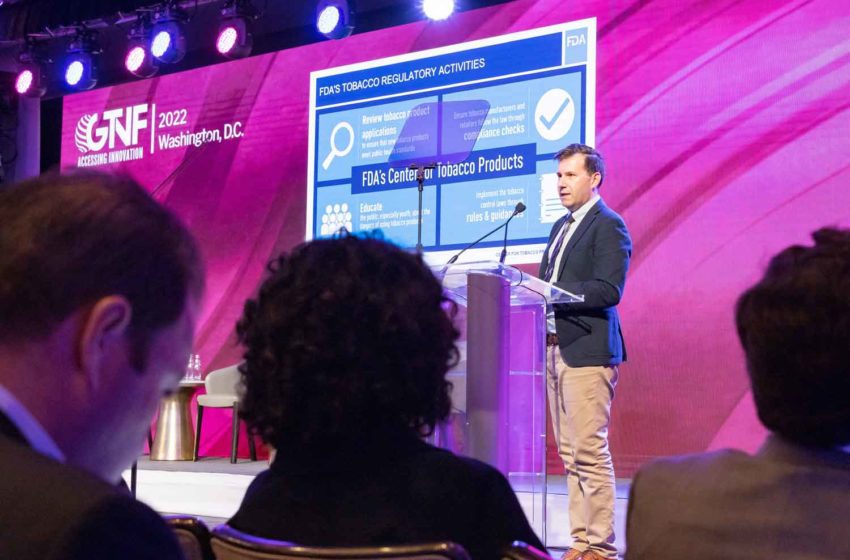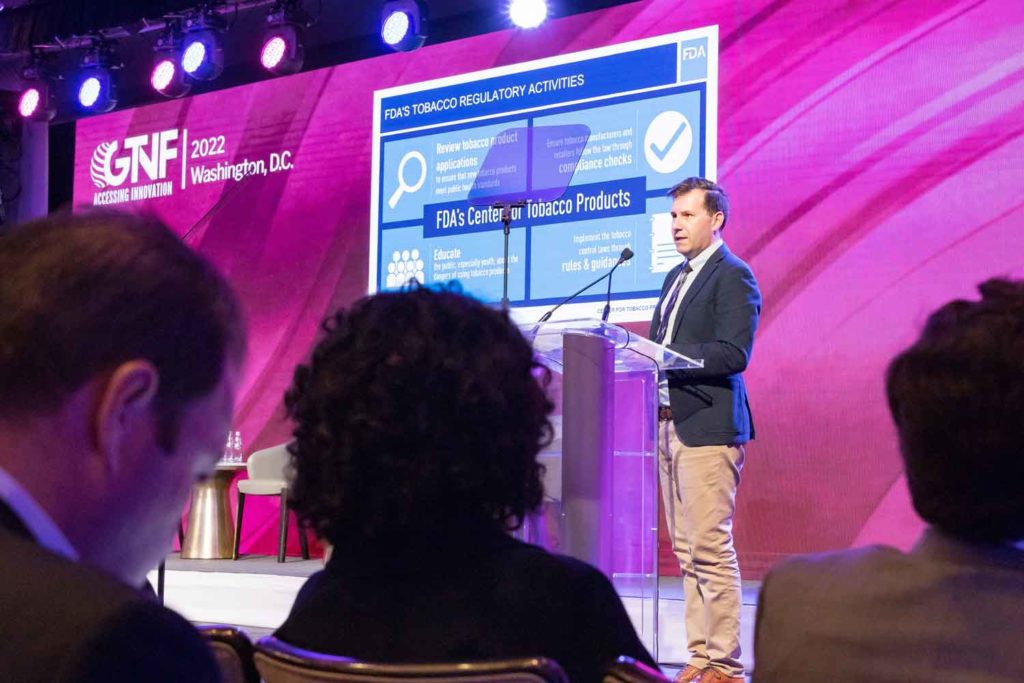Brian King


There are plenty of reservations about the way in which the U.S. Food and Drug Administration’s Center for Tobacco Products (CTP) has handled its responsibilities. During a brief speech at the GTNF 2022 in Washington, D.C., the new director of the CTP, Brian King, did little to quell those concerns. He did, however, acknowledge the continuum of risk. “We do have certain products that are lower risk than combustible cigarettes, and that’s an important component of the dialogue,” said King.
King told attendees that there is an opportunity for the CTP to assess the risk of youth vaping initiation and counterbalance that with the opportunity for adults who use e-cigarettes to quit combustible cigarettes.
“I think that [the] public health standard is pretty critical to the work we do, and it’s definitely a guiding light in terms of my determinations and decision-making,” he said. “Ultimately, it comes down to the science … it’s very critical, to me, to ensure that we use that as our guiding light. And of course, the onus is on the applicants to ensure that they are providing the most robust signs possible to inform decision-making.”
The FDA has long been criticized for its handling of the premarket tobacco product application (PMTA) process and is currently defending multiple lawsuits from vapor companies challenging its marketing denial orders (MDOs), including two from Juul Labs, which recently filed a lawsuit over the regulatory agency’s refusal to disclose documents supporting its MDO.
Juul claims the agency overlooked more than 6,000 pages of the data it submitted on the aerosols that users inhale, according to Joe Murillo, chief regulatory officer at Juul Labs, who also spoke at the conference.
King said that a sizeable portion of youth are still vaping flavored and disposable products. However, he also said that the potential benefits for adult smokers are “mutually exclusive” from youth uptake concerns. “I don’t think that they necessarily have to be separate; they can certainly be explored concurrently,” he said. “But again, we need to ensure that we’re considering the science from both ends when making our decisions.”
King said the agency is “continuing to make progress” on the estimated 1 million PMTAs for nontobacco nicotine products as well. He said over 90 percent of the applications have been completed. “We have 350 acceptances so far, and there’s about 800,000 that have received an RTA [a ‘refuse-to-accept’ letter], and I’m hopeful that within the next few weeks we should be able to get through all 100 percent of those 1 million.”
Being accepted for review is only the first step in the PMTA process. There are six stages, or rounds, to the PMTA process. After acceptance is filing, then a substantive review before an action is taken. King called the first step an important one. “[It’s] an important step, and I’m committed to ensuring that we keep things moving as expeditiously as possible,” King said.
King recently told the AP that he believes “there’s a lot of really important science and innovations” that have occurred in the vaping industry in recent years, adding that the most notable is nicotine salts in e-liquids. “We know that when you smoke a tobacco product, it’s a very efficient way to deliver nicotine across the blood-brain barrier. So it’s been very difficult to rival that efficiency in another product,” said King in the interview. “But in the case of nicotine salts, you have the potential to more efficiently deliver nicotine, which could hold some public health promise in terms of giving smokers enough nicotine that they would transition [off cigarettes] completely.”
King also discussed the FDA’s ability to force companies to comply with its MDOs. So far, very few companies that have been told to remove their products from the market have complied. King said the agency has multiple enforcement options to bring both manufacturers and retailers to heel.
“We have several tools available to us, including advisory actions,” he said. “We also have regulatory enforcement actions, including voluntary recalls as well as various other requested recalls. We can also take administrative action, civil money penalties (in terms of manufacturers, that penalty cannot exceed $15,000 for any single violation or $1 million for any number of violations related to a single action),” explained King. “When it comes to judicial action, we can do seizure, injunction and also criminal prosecution. I will say that when it comes to enforcement and compliance, nothing is off the table.”
King also updated attendees on the FDA’s external review of the CTP’s procedures, which is being conducted by the Reagan-Udall Foundation. Lauren Silvis, a former FDA chief of staff, was named as chair of the panel that has been asked to “evaluate regulatory processes and agency operations related to tobacco to help the center address new challenges as it works to reduce death and disease from tobacco and achieve its public health mission.”
“Within only a few weeks of assuming this role, we were told that there would be an external evaluation,” said King. “I actually wholly welcome it. I think it’s a good opportunity, particularly with new leadership, to identify areas where we’re doing things very well but also identify areas where we can enhance our efficiency and effectiveness. I have had meetings with [Silvis] and her team, and I’m confident that we’re going to get very useful information.
“It’s an ambitious timeline, 60 business days, so it’s going to work out to about 90 days total. It should finish probably by the end of the year, mid-December, and I’m looking forward to the opportunity to hear the recommendations. And I do have a very open mind on this. I’m always for improvement.”
King expects there will also be opportunities for external engagement, including listening sessions. He could not provide specifics during the speech but said he welcomes feedback from others in terms of informing the CTP’s processes.
“It’s not a one-size-fits-all, but I do think that we have some great opportunities here,” he said. “I’m fully committed to listening to the evaluator’s input and ensuring that we use it in a very useful way … then we’ll take it from there … I’m sure many of you have heard publicly, my calendar is rapidly filling up, and we are meeting with many—I know I’ve met with several of you in the room already, and I value those opportunities to meet with folks from across the spectrum, whether it be industry or public health … to hear people’s insights, what your priorities are.
“And those have been very productive and helpful to me. I do listen. I think it’s a very useful opportunity to me in terms of hearing specifically what the recommendations are from industry and what are areas where you feel it would be useful for FDA to engage in to make your life easier in terms of submissions and applications and [what] processes are overly complicated and could be improved,” said King. “I’m fully committed to ensuring that happens.”